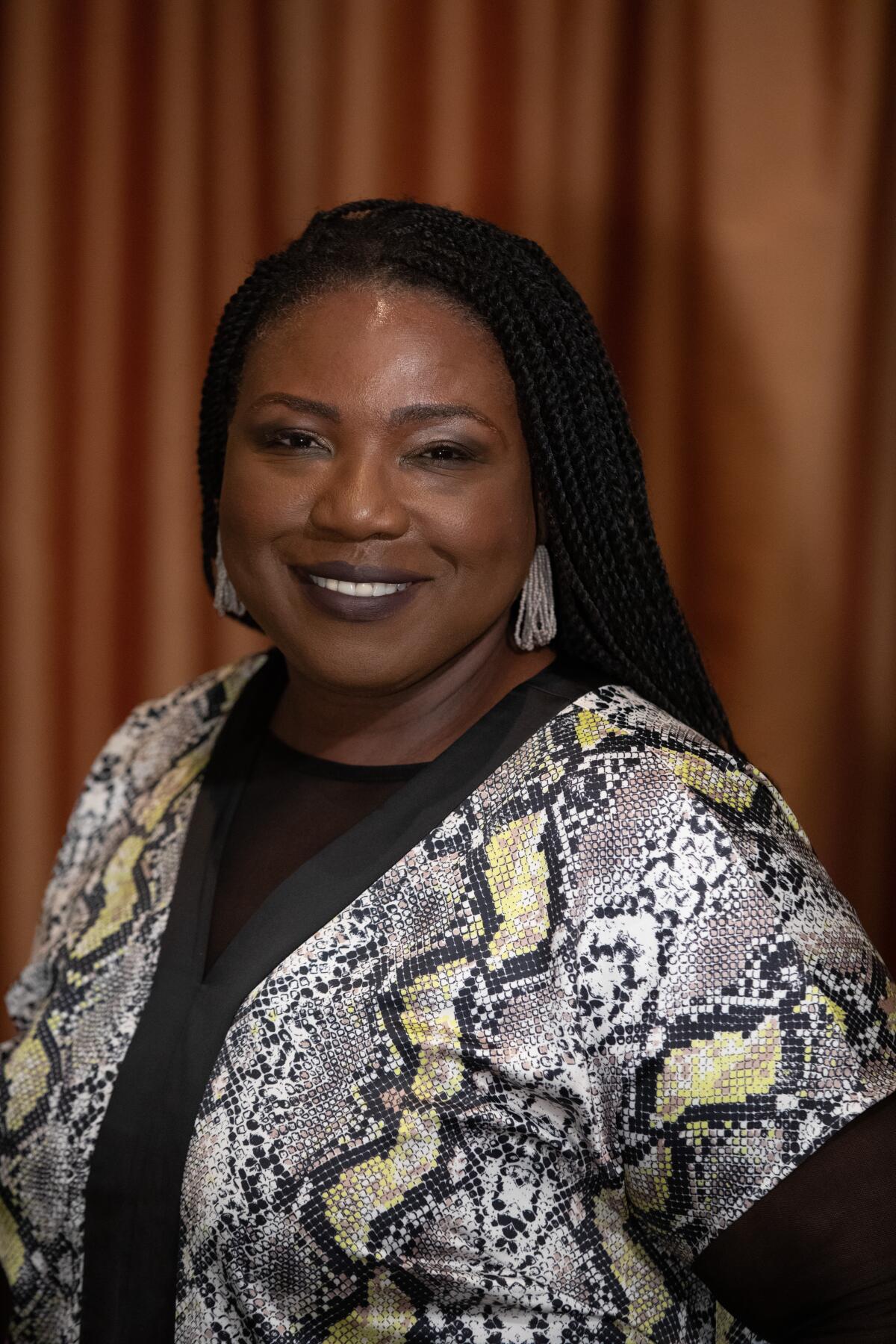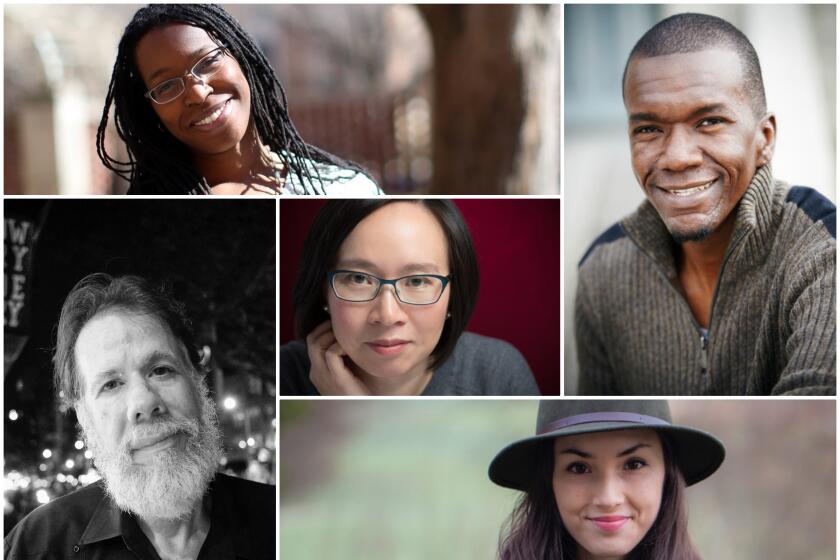With libraries under threat, Literarian Award goes to Watts-raised super-librarian Tracie D. Hall

- Share via
Tracie D. Hall has spent most of her professional life working in service to others: as a curator, a librarian, an advocate for digital literacy and equitable access — and currently as the executive director of the American Library Assn.
It made her a natural choice for the Literarian Award, bestowed annually by the National Book Foundation, which announced Hall as its 2022 honoree Wednesday morning, for “outstanding service to the American literary community.” But when she found out about it several months ago, Hall couldn’t quite believe it. Her first thoughts ran to the family that raised her in Watts.
“My grandparents both struggled with low literacy, and because of that they were avid that I would be a reader and a lover of books and ideas,” said Hall, 53, from her home in Chicago. Along with her mother, they spent a lot of time and energy nurturing Hall as a reader, writer and poet.
“It felt like a full-circle moment,” said Hall, an acknowledgment of their sacrifices and hard work more than a recognition of her own.
Hall will be honored on Nov. 16 in New York City during the 73rd National Book Awards ceremony, one of two lifetime-achievement recipients announced in advance (the other will be for Distinguished Contribution to American Letters). Five award winners will be announced at the ceremony for books in the categories of fiction, poetry, nonfiction, translated literature and young people’s literature.
Jason Mott took home the National Book Award for fiction. Other winners included Tiya Miles, Martín Espada and Malinda Lo.
This will be the second consecutive year the Literarian Award goes to a librarian; last year’s honoree was author and librarian Nancy Pearl.
That’s unusual but not a coincidence. “In this moment when books and libraries are under attack more than ever, we were thinking of her and her work,” said Ruth Dickey, executive editor of the National Book Foundation, in a video interview.
This year, book-banning efforts have rapidly spread across the country at a pace not seen in decades, fueled in part by politics, social media and increasingly aggressive tactics. And librarians are getting caught in the middle. From Michigan to Iowa to Idaho, libraries have been defunded or threatened with closure over complaints about books that, in at least one case, they don’t even stock. Among the most common targets are books about race, gender and sexuality.
The NBF’s board committee will recognize Hall’s long history of tacking in the opposite direction — toward greater inclusion and opportunity.
“She’s been a huge champion for equal access to information for everyone, not only for books but also literacy, which is so critical,” said Dickey. “[Hall] has been a real champion about the importance of dismantling racism in libraries and information services. … She’s incredibly inspiring and we’re so proud to be able to celebrate her work.”
Part of the joy of reading is the way it can disturb us.
Although the selection process is confidential, nominations are made by past National Book Award winners, finalists and judges and others from the literary community before the foundation’s board of directors makes the final selections. Honorees receive $10,000 and a brass medal.
Hall joins a distinguished roster of past Literarian honorees recognized for their work to advance literacy and culture, including Carolyn Reidy, CEO and president of Simon & Schuster; Dave Eggers, author and founder of McSweeney’s and 826LA; Lawrence Ferlinghetti, the poet and founder of San Francisco’s storied City Lights Booksellers and Publishers; Cave Canem, the literary organization; and legendary poet Maya Angelou.
Over the past two decades, Hall has worked in libraries across the country — from Seattle and Queens to New Haven and Hartford, Conn. In February 2020, just before the COVID-19 pandemic hit, she became the first Black woman to helm the ALA, considered the oldest and largest library association in the world. Before that, she was the culture program director at the Joyce Foundation, where she created programs to advance inclusion and equitable funding for arts institutions founded by and for Black, Indigenous and other people of color.
Born and raised in South Los Angeles, Hall grew up in the shadow of the famous Watts Towers. Every Saturday with her grandmother and brother, she would visit the Watts Branch Library, which was then located on 103rd Street.
As Hall browsed the shelves for books to take home, Bessy, her grandmother, would sometimes comment: “We didn’t have anything like this growing up.”
“And that was really hard for me to understand,” said Hall. “She was speaking to a history of segregated libraries. ... I understand now, and I understand why she was so insistent that I make use of the library.”
Laura Warrell’s debut novel, ‘Sweet, Soft, Plenty Rhythm,’ follows a noncommittal jazz musician and the many women he devastates.
Upon hearing the news, Hall also thought of Jack, her grandfather, who left Louisiana with Bessy for Los Angeles in hopes of a better life for their family. He worked odd jobs during the day and would stand outside a meat processing plant until the evening, hoping they’d offer him work. Some of the employees eventually convinced the foreman to give him a chance.
“And that’s how he ended up getting the job that he would stay on until he retired,” said Hall. For years, the couple lived in rented rooms and garages until they saved enough money to buy and repair a condemned house. For most of their life, they poured many of their hopes for the future into Hall, her brother and their cousins.
It was in that spirit that Hall put her life’s work into serving those less fortunate than she was, in hopes of giving them the same chance she feels lucky to have had. This award, like all her success, is larger than her, she said: “It is about all of the people who poured into you, all of the people who sacrificed. All of the people who couldn’t enjoy some of the privileges that you’ve had.” We are all, she added, “feasting on the fruits of that collective labor.”
Thousands of Angelenos descended upon the USC campus over the weekend for the 2022 L.A. Times Festival of Books. Here’s what they said about being back.
More to Read
Sign up for our Book Club newsletter
Get the latest news, events and more from the Los Angeles Times Book Club, and help us get L.A. reading and talking.
You may occasionally receive promotional content from the Los Angeles Times.











